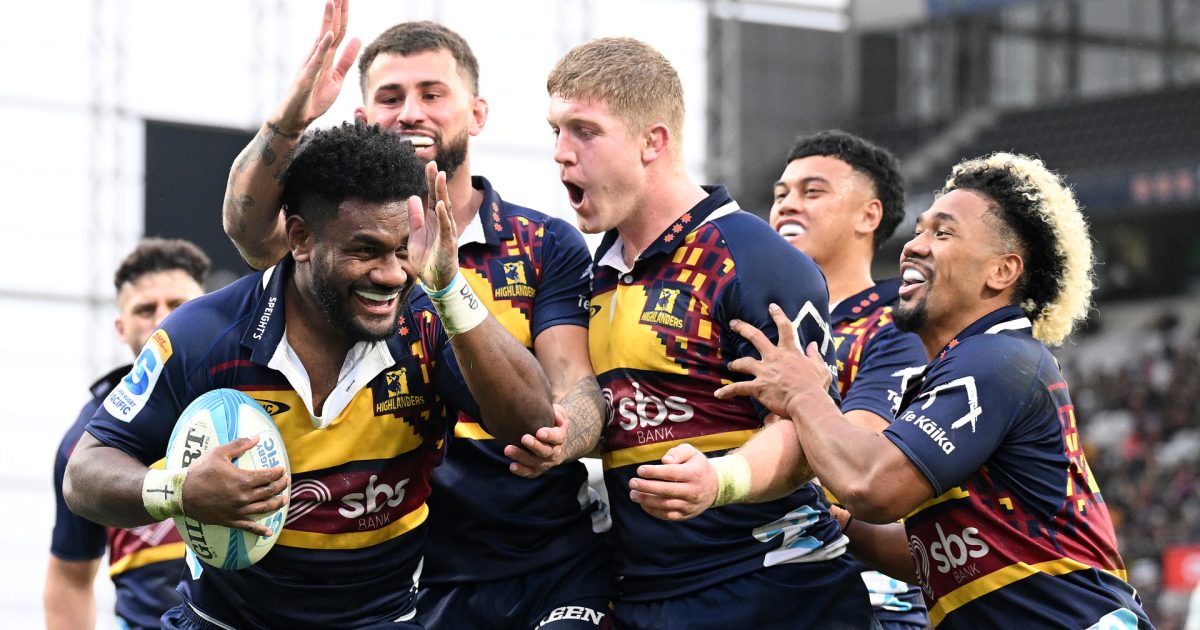Nareki and Ratumaitavuki-Kneepkens star as Highlanders thump Drua

The Highlanders have come away with a comprehensive 39-3 win over the Fijian Drua on Sunday afternoon in the crucial battle between the 7th and 8th placed teams on the ladder to secure quarter-final qualification.
With young No 10 Ajay Faleafaga getting the chance to start again for the Highlanders, the outside backs ran riot all afternoon as the home side got out to 18-0 lead by half-time.
Tries to outside backs Jacob Ratumaitavuki-Kneepkens and Jona Nareki and two conversions and two penalties by Sam Gilbert off the boot gave the Highlanders a comfortable lead.
It was a slick backs play from the Highlanders’ set-piece that opened the scoring just five minutes in, left wing Nareki finished the move in the corner untouched after the final Ratumaitavuki-Kneepkens’ pass.
It was that man Nareki who turned provider for the Highlanders’ second, busting through multiple defenders from a scrum play before finding his fullback to return the favour.
Jona Nareki get outta here 🔥🔥🔥#SuperRugbyPacific #HIGvDRU pic.twitter.com/Xo5aeS5T49
— Super Rugby Pacific (@SuperRugby) May 26, 2024
The Fijian Drua stopped the bleeding with a penalty early in the second half via Isaiah Armstrong-Ravula’s boot, but the Highlanders went straight back downfield and scored Jona Nareki’s second.
After a set play involving a tap from prop Ethan de Groot, Nareki strolled over a few phases later from close range to extend the lead to 25-3 after halfback Folau Fakatava dictated play from the base of the ruck.
Fijian-born Timoci Tavatavanawai got in on the action next, combining with Ratumatavuki-Kneepkens for a 1-2 return pass after a cross-field kick from second five Sam Gilbert.
The right wing latched onto the kick before a touch pass back inside to the fullback, who drew a defender and offered the ball back to the powerful finisher to take a 32-3 lead.
One of the form centres in the competition, Iosefo Masi, sparked the Drua’s response with a long line break into the Highlanders’ 22. A high tackle gave the Drua a chance to kick to the corner and attack, but a ruck penalty won by Nikora Broughton snuffed out the opportunity.
The Drua had a lineout maul from the five stopped a short while later, all but ending any hopes of a miraculous comeback with 15 minutes to play.
The Highlanders created a few opportunities in the final quarter with Ratumatavuki-Kneepkens involved with some deft touches, but the final polish was missing.
Reserve loose forward Broughton added the exclamation mark on the performance with a brilliant read for an intercept thirty metres out, diving under the sticks in front of the Zoo for a 39-3 lead.
A late yellow card was shown to Drua fullback Ilaisa Droasese for a knocking down a pass, but Faleafaga was happy to end the game.
The Highlanders enjoyed a strong set-piece, laying the platform for the dangerous backs with 100 per cent efficiency at the lineout and 89 per cent at the scrum, while Sean Withy led the forwards with three turnovers won.
In his 50th Super Rugby match, halfback Folau Fakatava was lively, making his presence felt in the defence.
The Drua head back to Fiji to play the Rebels at Churchill Park while the Highlanders travel away to play a crunch match with the Hurricanes having locked down a playoff spot.






































































